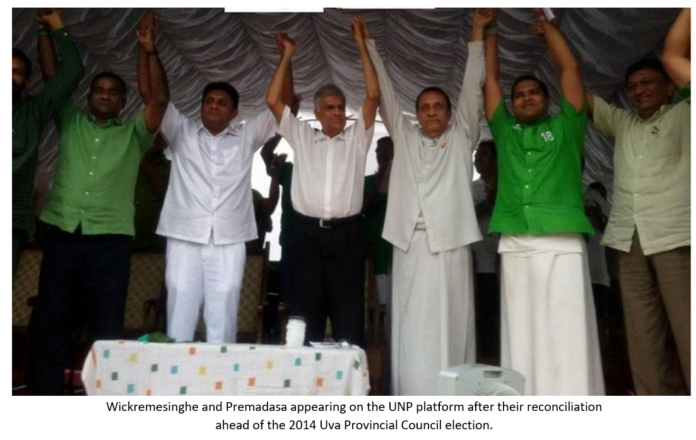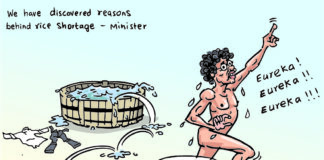By Vishvanath
Rational thinking and power are mutually exclusive, in this country, as is public knowledge. Power acts as an intoxicant and drives the wielders of it to extremes, in most cases. Electoral defeats have a sobering effect on politicians blinded by their ambitions to reality, which they are left with no alternative but to come to terms with. Some Opposition politicians have realized that they have to sink their differences and join forces if they are to recover lost ground against a formidable rival like the JVP-led NPP, which is on a winning streak.
The SJB and the UNP, or some of their seniors, to be exact, are making overtures to each other. Some staunch supporters of UNP leader Ranil Wickremesinghe and SJB leader Sajith Premadasa are busy trying to bring about a rapprochement between the duo and bring their parties together to contest future elections. But if efforts being made to forge an alliance between the two parties reach fruition, who will lead it—Premadasa or Wickremesinghe? This question remains unanswered.
When Wickremesinghe entered the presidential fray in September, as the then incumbent President, he could not have been unaware that his chances of winning were remote, and his participation in the contest would cause a split in the anti-NPP vote, making it even more difficult for Premadasa in the race, much to the benefit of NPP presidential candidate, Anura Kumara Dissanayake. But Wickremesinghe wanted to retain the UNP leadership, which he would have lost if Premadasa had secured the presidency. A Premadasa victory would have led to a merger of the SJB and the UNP at the expense of Wickremesinghe. Dissanayake obtained 5.7 million votes (42%) while Premadasa and Wickremesinghe polled 4.5 million votes (32.7%) and 2.2 million votes (17%), respectively. Statistically, it can be argued that if the UNP and the SJB had fielded a common presidential candidate, they would have stood a better chance of obtaining more votes than Dissanayake.
The argument that Wickremesinghe, as the UNP leader, did not campaign hard for Premadasa when the latter contested the 2019 presidential election as the UNP candidate on the NDF ticket is tenable; he did not want to lose the UNP leadership to Premadasa. So, the question is whether Wickremesinghe will agree to a coming together of the SJB and the UNP if it will cost him his hold on the UNP leadership; obviously, he does not want to play second fiddle to Premadasa, and vice versa. The biggest obstacle to the ongoing campaign to unify the UNP and its offshoot, the SJB, is their leaders’ intransigence.
Wickremesinghe and Premadasa however find themselves in a dilemma. Their party seniors are keen to bring the UNP and the SJB together to shore up their electoral prospects, with two more elections slated for 2025. At this rate, popular support for the UNP and the SJB is likely to decrease further. They are in need of a rallying point.
Of the Opposition parties, only the SJB and the UNP have the potential to emerge as a countervailing force against the NPP by attracting the non-voters and the floating voters, who backed the NPP overwhelmingly in the recent presidential and parliamentary elections. There is the possibility of the seniors of the SJB and the UNP pressing for a merger of the two parties, and rebelling against their leaders to achieve their goal.
The total number of non-voters in the Nov. 14 general election was more than 5.3 million, and there were as many as 667,240 rejected votes. The NPP obtained a two-thirds majority (159 seats) by polling more than 6.8 million votes and the SJB secured more than 1.9 million votes and 40 seats.
Out of 17.14 million registered voters, more than 13.6 million voted in the September presidential election, where the voter turnout was 79.4%. The total number of votes cast in the general election was only 11.8 million (68.93%). The decrease in the voter turnout was 1.8 million. The NPP’s vote share rose from 5.7 million (including preferential votes) in the September presidential election to 6.8 million in the November general election; it was an increase of 1.1 million votes. SJB presidential candidate, Premadasa, polled 4.5 million votes (including preferential votes) in the September presidential election, but the SJB’s votes plummeted to 1.9 million in the November parliamentary election. The UNP, which obtained 2.2 million votes in the presidential election could get only 0.5 million votes in the general election, which it contested as the main constituent of the NDF alliance. Thus, it can be seen that the decrease in the voter turnout in the general election affected the SJB and the UNP more than others. Why the UNP and the SJB seniors are striving to bring their parties together is not surprising.
The NPP’s spectacular win in the November general election will still be fresh when the country goes to the polls early next year to elect local councils. Unless the Opposition undergoes a radical shake-up and changes its strategy, it will not be able to prevent a further demoralization of its rank and file. The NPP is bound to pull out all the stops to win the local government and provincial council polls, for it cannot afford a midterm electoral setback. What signaled the end of the Mahinda Rajapaksa regime in 2015 was the SLFP-led UPFA’s ‘poor’ performance in the Sept. 2014 Uva Provincial Council election. It managed to secure the council but could retain only 19 out of 25 seats it had in the previous council, and the UNP obtained 13 seats (an increase of 6 seats), and the JVP 2 (an increase of one seat). The UPFA’s votes decreased from 418,906 (72%) in the 2009 Uva PC election to 349,906 (51%). Shashindra Rajapaksa was the UPFA chief ministerial candidate. That setback for the Rajapaksa family stood the UNP in good stead in the presidential election that followed in January 2015. The UNP was able to ensure the election of the common presidential candidate of the Opposition, Maithripala Sirisena, as President, who defeated the then incumbent President Mahinda Rajapaksa.
What helped the UNP better its performance in the Sept., 2014 Uva PC poll was the reconciliation between UNP leader Wickremesinghe and Premadasa in the run-up to the election. They appeared on the same platform holding hands together with other UNP seniors, boosting the morale of their supporters. Maybe the seniors of the UNP and the SJB seniors are trying to do something similar again. But they will have their work cut out.





